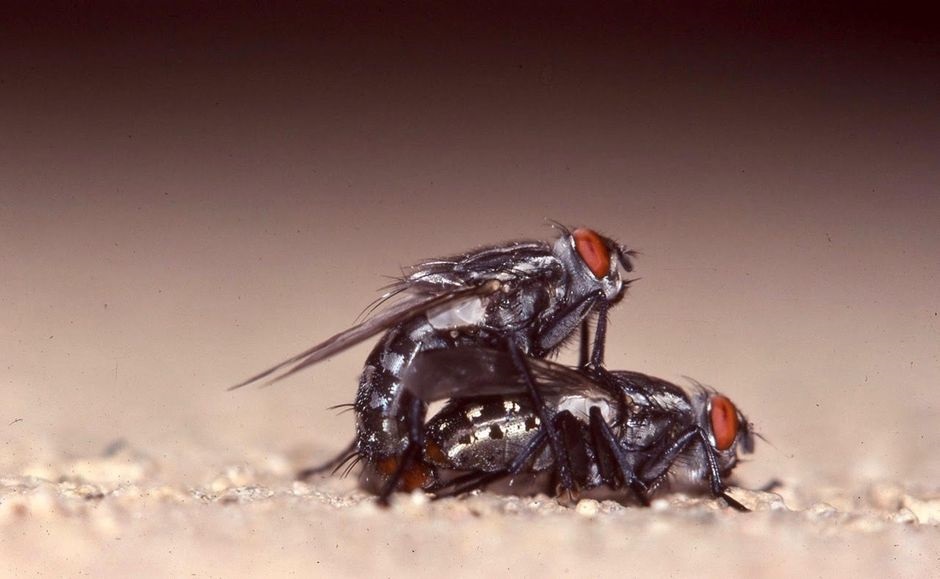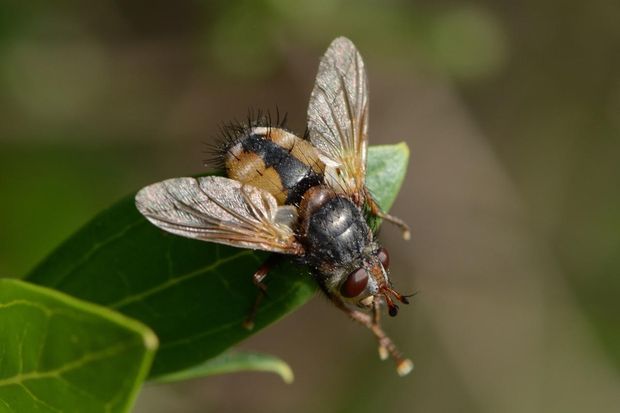To date some 160,000 different species have been recorded, although it is speculated that millions more remain to be identified.
 Photo: Antonio Cruz.
Photo: Antonio Cruz.
Or else, if you will not let my people go, behold,
I will send swarms of flies on you and your servants and your people, and into your houses.
And the houses of the Egyptians shall be filled with swarms of flies,
and also the ground on which they stand.
(Ex. 8:21)
The term “fly” occurs about ten times in the Bible (Ex. 8: 21-31; Palm 78:45: 105:31; Ec. 10:1; Isaiah 7:18). There are two Hebrew words which are usually translated as this word in English.
One of them is arob, which is the term used for the fourth of the plagues in Egypt and seems to refer, in general, to all species of flies. The Septuagint renders it as “horsefly”, the diptera (soil-born) fly that is much more annoying than the common fly, as it bites and sucks the blood of its victims.
The second Hebrew term is zebub, which comes from a root verb meaning “to fly around”, and is also used to refer to all types of these annoying insects (flies, mosquitoes, horseflies, etc.) In point of fact, the inhabitants of Ekron (one of the ancient cities of the Philistine Pentapolis, situated in southeast Canaan) worshipped Beelzebub, “the Lord of the Flies”, and were convinced that this god had power over these insects (2 Kings 1:2).
However, the Hebrews mocked the worshippers of this other manifestation of Baal because, among other things, the meat in the pagan temples was allowed to rot, so they were always full of flies and stank.
While the plagues inflicted on Egypt were one-off supernatural events, as the Bible shows, the irritation caused by the insects has continued, to a greater or lesser extent, to persist in the territory of the Nile right up until the present day. Every year, in the flood season, the number of flies, horseflies and mosquitoes increases to such an extent that they can amount to plagues. They invade vast regions, biting animals and people and contaminating their food (Isaiah 7:18; Ec. 10:1). [1]
The book of Exodus recounts the story of the plague with these words: “There came great swarms of flies into the house of Pharaoh and into his servants' houses. Throughout all the land of Egypt the land was ruined by the swarms of flies.” (Exodus 8:24). In fact, flies are capable of transmitting many diseases, such as cholera, typhoid, dysentery, salmonella, trachoma, etc., as they easily make contact with other organisms and contaminated substances. For this reason, as the Bible states, they can corrupt everything they touch.
 To date some 160,000 different species have been recorded, although it is speculated that millions more remain to be identified.
To date some 160,000 different species have been recorded, although it is speculated that millions more remain to be identified.[photo_footer] Photo: Antonio Cruz. [/photo_footer] The sarcophagi (Sarcophagidae) are a cosmopolitan family of diptera insects, popularly known as “flesh flies” because their larvae develop, for the most part, in the living flesh of animals and humans, though also in carrion and excrement. There are known to be around 3,100 species of flies belonging to this family alone.
One of the most widespread is the Sarcophaga carnaria which, as the name suggests, feeds on flesh, and are the first to lay their eggs in corpses. They can transmit several different pathogenic microbes to other animals, and also to people, which can in turn trigger ailments ranging from cutaneous ulcers (myasis), cholera, salmonella, parasitical worms to leprosy, among many other conditions.
However, it’s not all bad news as far as flies are concerned. It is believed that for every human on the planet there are some 17 million flies.[2] To date some 160,000 different species have been recorded, although it is speculated that millions more remain to be identified. Many of these flies pollinate plants, clean the ecosystems of decomposing corpses, feed on our organic waste, kill spiders and other insects, and some, such as the famous vinegar fly (Drosophila melanogaster), have been of crucial importance for advances in genetic science, etc., etc.. As a matter of fact, flies have had a vital role to play for our planet, and for the human race.
The Biblical plague of flies (Ex. 8:20-32) occurred as a result of Pharaoh’s refusal to let the Hebrew people leave Egypt. God commanded Moses to present himself before the Egyptian king when the latter was going down to the river, and to ask him to release the Hebrews. In the absence of an affirmative reply, all kinds of flies began to cover the country of the Nile. The magnitude of this divine intervention can be appreciated in view not only of the enormous number of winged insects, but also of their geographical limitation (They attacked the whole country except the land of Goshen, where the Hebrew slaves lived), Besides, the precise timing of the beginning and ending of the plague can also be seen as miraculous, as can its theological meaning.
When the flies devastated the land, Pharaoh had no choice but to call Moses to give the Hebrews permission to offer their sacrifices, but only within the territory of Egypt. The shrewd Hebrew patriarch did not accept this offer, adducing that such an act would be an abomination to the Egyptians. How would they react if they saw the Hebrews sacrificing animals which their religion regarded as sacred or untouchable? Is it possible that the mind of Pharaoh was beginning to entertain doubts and that he might even have thought that this could infuriate Egypt’s gods? In this case, he would not only have the God of the Hebrews as his rival, but also Egypt’s own gods. In whichever case, Pharaoh accepted Moses’ argument and he gave the Hebrews permission to go to the desert to offer sacrifices to Yahweh, far away from the scandalised eyes of the Egyptians. That brought the plague of flies to an end, but what did not end was the hardness of Pharaoh’s heart. Once again, he refused to let the people leave.
One of the things that this famous story illustrates is the present-day religion of convenience. Many people conceive of religion as serving utilitarian and self-centred ends. Just as Pharaoh asked Moses to pray for him, just in case his God was the true God, there are some people nowadays who take ideas and beliefs from a range of religious belief-systems to construct a comfortable, convenient à-la-carte religion. However, Christianity is not founded upon egotism or on superstitious faith, but on love towards our neighbour, generosity, altruism and the search for justice and peace.
[1] Keller, W. And the Bible was right
[2] https://www.nytimes.com/es/2017/11/16/moscas-funciones-beneficios/

Las opiniones vertidas por nuestros colaboradores se realizan a nivel personal, pudiendo coincidir o no con la postura de la dirección de Protestante Digital.
Si quieres comentar o